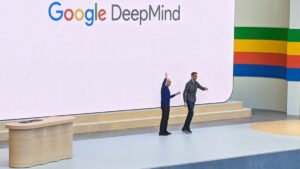Some AI Professionals Express Concerns Over Google DeepMind’s Noncompete Policies

Google DeepMind’s Controversial Noncompete Clauses
In the competitive field of artificial intelligence (AI), Google’s DeepMind division is tightening its hold on talent through strict noncompete clauses. These contractual obligations are creating significant obstacles for employees who leave the company, often forcing them to delay joining rival organizations for months, if not more.
DeepMind’s Use of Noncompete Clauses
Reports indicate that DeepMind employs aggressive tactics to prevent key employees, especially those working on critical projects like the Gemini AI model, from transitioning to competitors like OpenAI or Microsoft. Some senior researchers can face a full year of paid "garden leave," during which they are prohibited from pursuing new job opportunities. This can significantly impact their career trajectory in a rapidly evolving field.
The Implications of Extended Noncompete Periods
Leaving an organization can be challenging in AI, where new discoveries and advancements happen swiftly. A former DeepMind employee expressed that a six-month or even year-long gap can severely stifle a researcher’s career momentum. "Who would hire you to start in a year?" they questioned, highlighting the urgency of maintaining relevance in such a fast-paced environment.
This issue gained attention when Nando de Freitas, a former director at DeepMind and currently at Microsoft, shared on social media that he regularly receives messages from distressed DeepMind employees regarding their noncompete agreements. He criticized the power dynamics at play, describing it as an "abuse of power" and urging employees to resist these contracts.
Google’s Justification: "It’s Standard"
In response to critiques of their noncompete clauses, Google claims that these contracts align with market norms. A spokesperson defended the policy by stating, "Our employment contracts are consistent with industry standards." They argue that given the sensitive nature of AI research, such measures are necessary to protect corporate interests.
However, critics of these practices argue that what may be deemed "standard" cannot justify the negative consequences on employee mobility and career development. In a tech industry where a few months can determine leading advancements, the implications of these noncompete clauses deserve careful scrutiny.
The Legal Landscape of Noncompete Clauses
The enforceability of noncompete agreements varies by location. For instance, in California, where many prominent tech companies are based, these clauses are typically unenforceable. In 2023, the state further expanded its bans to include agreements made outside its borders. Conversely, DeepMind, located in the UK, can legally impose noncompete clauses if deemed "reasonable."
This discrepancy has motivated some UK researchers to consider relocating to California as a potential escape from such stringent contractual obligations. As the competition for AI talent intensifies, the distinct strategies implemented by companies like DeepMind may be indicative of broader trends on the horizon.
Navigating the AI Talent Wars
With the growing demand for skilled AI professionals, companies are leveraging every tool available to secure top talent—including competitive salaries, benefits, and now, restrictive employment contracts. This evolving landscape raises critical questions about how organizations can attract and retain experts while balancing their corporate interests.
DeepMind’s strict noncompete clauses may help protect its innovations in the short term, but they could also lead to dissatisfaction among employees and a potential talent drain in the long term. As the AI industry continues to evolve, the effectiveness and ethics of such employment practices will be vital in shaping the future of work within this dynamic field.






